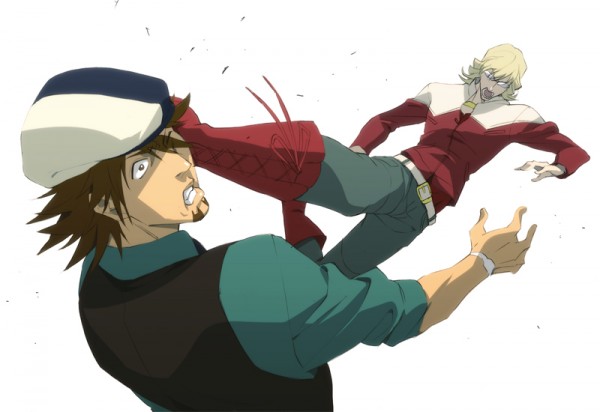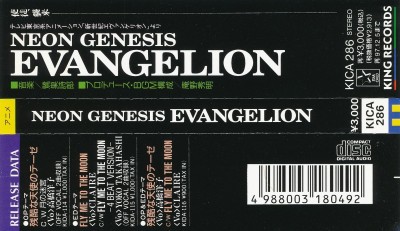Anime Music Bootlegs: Figuring out the fakes from the real thing

Well, that’s exactly what happened to ratsavage/Joojoobees (of Abandoned Factory Anime Reviews), that’s happened to one of this site’s contributors, and that’s also happened to me. Needless to say, it’s quite a shocker to find out that something you spent hard-earned money on isn’t the genuine article and it frankly sucks. In this day and age of digital music files, it takes someone who’s quite the fanatic (whether it’s about anime soundtracks in general or some specific composer) to actually shell out for a physical disc, and the last thing I want to see is money going to a bootlegger than the real deal if the intention is to enjoy the real disc. So with that in mind, here’s my 1-step method to make sure that what you buy is a genuine article. And best of all, I’m willing to bet it works 99.95% of the time!
Catalog numbers are your best friend
If you’ve ever looked through the anime music reviews on this site, you’ll notice that we always list something called a catalog number, usually made up of 4 letters, followed by a hyphen, then usually 1 to 5 numbers (eg: VTCL-60114 or SVWC-7681). The catalog number can often be found on the spine of the CD case and is also located on the back of the CD case. This piece of metadata generally tells you what company and label produced the CD (VICL = Victor Entertainment while SVWC = Sony’s Aniplex division) and the sequenced number within that company/label’s releases. If you want to see whether a CD you own or plan to buy is the real thing, the first thing to locate is the catalog number. And if you’re going to buy it from someone else on eBay (a notorious haven for bootleg anime music) or something, make sure they list the catalog number or you can easily locate it in the pictures they use.

- K-O Records: Their catalog number looks something like KO-1111
- SonMay Records: Their catalog number looks something like SMG-1111, GGG-1111, A&G-1111, and GSM-1111
- Alion International Records: Usually ALCA-1111 or something similar
- Miya Records: Generally MICA-1111
- Ever Anime International Records: Includes GM-1111, A8-1111, and AnG-1111
So yeah, if you spot any of these prefixes in your collection and a check for the company that produced the CD matches with any of those above, then you’ve got a bootleg on your hands. Not only did your money not go towards the artists you love so much, the quality might not even be up to par compared to the original. If you’ve been fortunate and not have had to purge any bootlegs from your collection, then let this guide serve as a way for you to filter out future purchases for any fakes.
Finally, if you are looking for places to purchase physical anime music CDs (for whatever reason), CDJapan, Play-Asia, and YesAsia are generally good places to shop (especially with the decline in the Japanese yen making stuff cheaper). If you’re more budget-conscious like me but are fortunate enough to live near a Book-Off, I’d poke around there, though I have seen quite a few bootlegs appear here and there (so keep Anime Instrumentality or VGMdb in mind when you find a CD that you really want to buy for catalog number confirmation purposes!). Mandarake stores are also a good choice, but their eCommerce site isn’t too user-friendly for English speakers, so you might face a few hurdles when using it. If you’re especially brave, you can try perusing YahooJapan auctions. Finally, aside from a few select sellers, eBay is not a place I’d recommend you use if you’re looking for anime soundtracks.
So with that, happy hunting and hope you find some musical gems along the way!

The Taiwanese bootlegs have its own catalog numbers, yeah. But that’s because they’re a grey-market good over there.
REAL bootlegs will just have photocopied inserts without the additional markings. It’s rare, but I’ve seen this on occasion.
@omo
Heh, so just like figurines then in that they try to make the CD case look legit, except probably identifiable if the quality of the printer is worse than those of the original.
As for the Taiwanese bootlegs, I know some of them were able to obtain some rights to the music to some anime/games. The bulk seem to be uh.. less desirable?
LOL don’t get me started on bootleg figures. That is another long story…
Since the early 00s, Taiwanese anime music publishers are slowly going legit. But I don’t know what that means to the countless unlicensed goods already in the marketplace. It’s kind of odd, because when it comes to things like manga, it’s pretty much 100% legit.
Must be because of prices I guess.
While I never got a Bootleg CD, I think it’s shameful that they produce these as it’s cheap to burn a CD, slap a label on it and print a photo copy of the cover. Still, I won’t be surprised if the sound quality of the bootlegs are bad compared to the originals.
As for me, I usually buy my CDs from CDJapan since I can earn frequent shopping points. Yes, shipping anything from Japan is expensive, although the exchange rate is getting more favorable thanks to the magic of Abenomics, but everything came in one piece except from one instance where I had a cracked CD case. Thankfully, the CD was alright though.
It’s not really a shameful thing. It’s just the unfortunate circumstances of international politics …
In my case the whole think looked very professional. The entire booklet was re-created, and it even had one of those edge things that have a barcode. I never would have known this was a bootleg, except that ZZ recognized it instantaneously.
Yes, I have heard instances of that not only with CDs, but video games, namely DS games. Because laser printers and high quality inkjet printers are readily accessible, it’s hard to detect. At least there are always a few things to check to see it’s a fake and thankfully there are ways to detect it.
Also, I noticed something when looking on the back of my CD. The catalog number is also printed on the spindle part of the CD on the back. This should give everyone an idea how it looks like.
http://skitch.chikorita157.com/Photo_2013-03-20_%E5%8D%88%E5%BE%8C7_01_34-20130320-191433.jpg
If it’s missing or has an illegal catalog number, it’s fake.
@chikorita157
I’ve only had one transaction with CDJapan where I was worried since I had waited over 2 months before my order finally came. Beyond that, it’s been smooth sailing. Play-Asia brought me one cracked CD case, but they seemed to know that and made up for it with some random J-pop ED theme to Taisho Yakyuu Musume. So it all worked well.
I was very impressed by Mandarake though. I’ll have to start monitoring them more closely once I have more money to spend on OSTs again.
In my experience it’s hard to find stuff via Mandarake because things sell out pretty fast, but i guess if you’re looking for used overseas, it’s one of the best portals.
If anyone needs another testimony for CDJapan, I’ve been using it for over 10 years and have not had a problem. Don’t ask how much I spent though…
Obviously this post was a little too late to save me, but I think it provides some good tips I can use next time. BTW, I bought this disc “through” Amazon, but from a 3rd party, so it can happen that way, too. Live and Learn, I guess.
Pingback:Achieving Instrumentality Through Western Means and Not Anime - Anime Instrumentality Blog